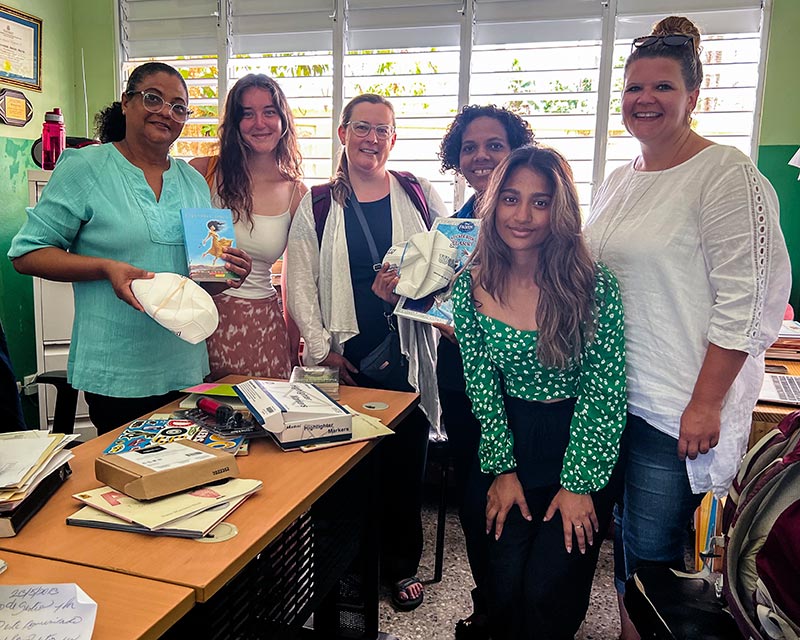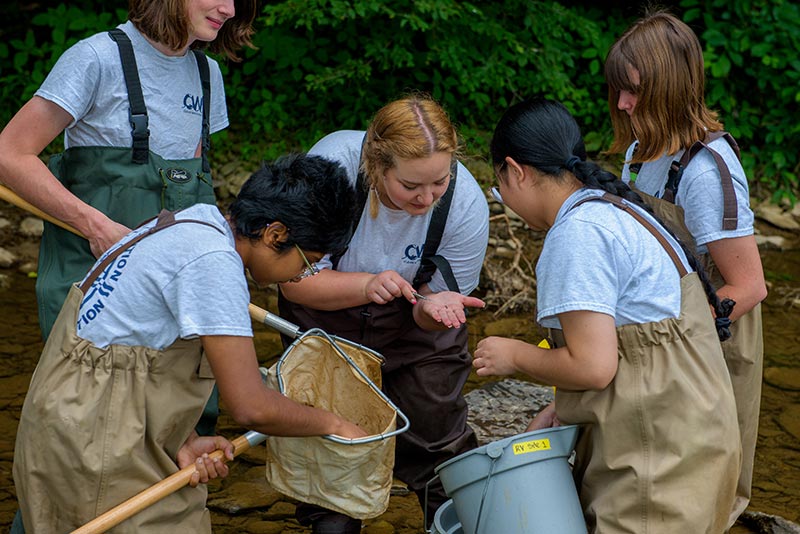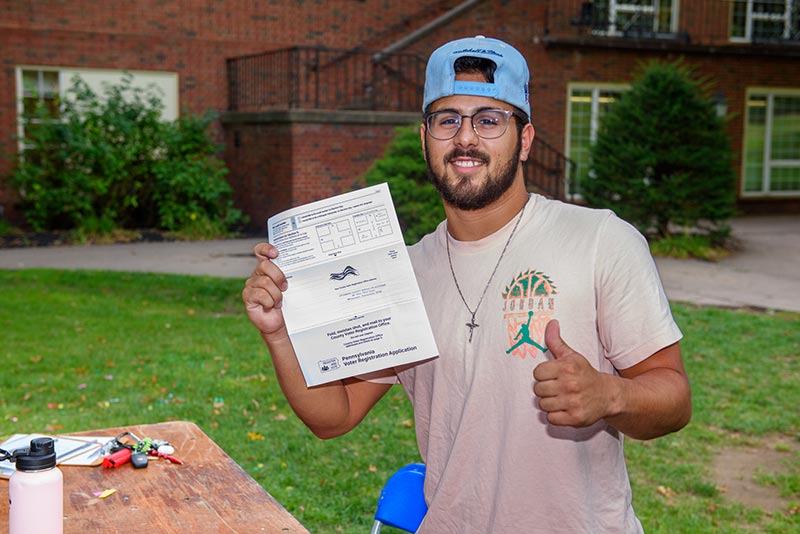You are here:
Highlighted Projects
Community-based learning affords Lycoming students amazing opportunities for real-world, collaborative experiences. If you're interested in earning a liberal arts and sciences degree that incorporates community based learning, we can help you find the right courses to help you reach your career goals. Read about how our students work to establish and nurture connections locally and abroad.
Connecting the World through Remote Teaching
 During a pandemic that prevented international travel, Lycoming College faculty and students worked together to continue providing students with a global perspective and an opportunity to learn through service. Education classes led by Dr. Rachel Hickoff-Cresko and Dr. Amy Rogers and Spanish courses taught by Dr. Sandra Kingery collaborated to bring interactive teaching methods to classrooms in Las Terrenas in the Dominican Republic by leveraging remote technology. As a continuation of the College’s committed partnership through the Interdisciplinary Dominican Republic Program and associated Warrior Coffee Project, students learned to apply a community-centered, needs-based approach in creating and delivering a variety of lessons.
During a pandemic that prevented international travel, Lycoming College faculty and students worked together to continue providing students with a global perspective and an opportunity to learn through service. Education classes led by Dr. Rachel Hickoff-Cresko and Dr. Amy Rogers and Spanish courses taught by Dr. Sandra Kingery collaborated to bring interactive teaching methods to classrooms in Las Terrenas in the Dominican Republic by leveraging remote technology. As a continuation of the College’s committed partnership through the Interdisciplinary Dominican Republic Program and associated Warrior Coffee Project, students learned to apply a community-centered, needs-based approach in creating and delivering a variety of lessons.
The early childhood education class worked with the Anacaona Library on their remote storytelling project. They chose age-appropriate books and developed lesson plans and reading questions to better facilitate student engagement and understanding. Students in the modern languages class then worked on translating the materials into Spanish so that they could read the stories and pose questions developed by the education students to the audience, demonstrating interactive teaching strategies, in educational videos shared with Dominican Republican teachers. The secondary education course developed content lessons specific to the culture and region, with topics ranging from probability and metaphors in literature to coastal erosion and ocean conservation. College students learned to better identify community needs and gained a global perspective while providing teachers with supplementary teaching materials that serve as a model of interactive, student-centered pedagogy.
Ensuring Urban Stream Water Quality
 When municipalities surrounding Lycoming College grew concerned about urban stream water quality, they enlisted the help of Lycoming College’s Clean Water Institute (CWI). By working in partnership with a team of CWI student interns, led by Dr. Leslie Rieck, the municipalities set out to achieve compliance with urban stormwater environmental regulations.
When municipalities surrounding Lycoming College grew concerned about urban stream water quality, they enlisted the help of Lycoming College’s Clean Water Institute (CWI). By working in partnership with a team of CWI student interns, led by Dr. Leslie Rieck, the municipalities set out to achieve compliance with urban stormwater environmental regulations.
CWI interns employed a multi-pronged approach to address concerns, which saw them gain a deeper understanding of the community’s urban water chemistry and local aquatic life, as well as Geographic Information Systems (GIS) for a clearer picture of stormwater flows in relevant areas. The interns also connected with the community by conducting educational events for K-12 students and the general public, teaching local residents how they can address stormwater issues. An intern-built website (http://stormwater.lycoming.edu/) also aided in their education outreach efforts.
The work with surrounding municipalities has supported a number of Lycoming student research projects and poster presentations, as well as a publication featuring a student co-author, with many anticipated future learning endeavors. CWI has strengthened partnerships with community stakeholders who have the ability to offer internships, jobs, and other experiential community-based learning opportunities for CWI interns.
ALL IN Voter Challenge
 Lycoming’s campus celebrates the important ways it can take part in the democratic process, and the ALL IN Voter Challenge focused on three main components: voter registration, turnout, education. The Challenge helped students, faculty, and staff engage in civil public discourse and close voting gaps based on age and race during the pivotal 2022 midterm elections.
Lycoming’s campus celebrates the important ways it can take part in the democratic process, and the ALL IN Voter Challenge focused on three main components: voter registration, turnout, education. The Challenge helped students, faculty, and staff engage in civil public discourse and close voting gaps based on age and race during the pivotal 2022 midterm elections.
Students enrolled in Lycoming’s Civic Engagement course worked together to organize a voter registration drive that saw nearly 70 students register to vote, either locally or in their home state. Voter education also played a role in the effort, ensuring that students understood how and when to request and return absentee ballots.
Classroom content included two guest speakers, helping to ensure that students connected the talks with other strategies for continuous civic engagement:
Williamsport Mayor Derek Slaughter engaged students in a discussion about leveraging the power of their vote, specifically as college students who get to decide whether to cast their ballot in their home state or here in Pennsylvania, and why voting is an important way to become engaged in their local community.
State Sen. Gene Yaw ’70 spoke with students about being an informed voter and understanding the importance of political participation. He discussed his own journey from Lycoming College to state senator and what led to his decision to pursue public service as a career path. He provided insight into what his position involves, specific to the district he serves, including the challenges of the job and his specific initiatives.
Archaeology Field Experience
Students studying archaeology at Lycoming College are given a solid foundation in the theories, methods, and diverse approaches that archaeologists use to answer important questions about cultural diversity and social change through time and across vast geographic regions. Given the rigorous requirements of the program, it's no surprise that field experience plays an essential role in the education of aspiring archaeologists.
Five-week field experiences at the Centre of Visual Arts and Research (CVAR) in Nicosia, Cyprus, tie learning with community projects. In 2022, students researched and mounted an exhibit entitled, “Sounds of Cyprus,” which highlights the ways in which two distinct Cypriot communities — the Turks and the Greeks — played music together and participated in each other’s celebrations until the communities were separated as a result of the Turkish invasion in 1974. The “Sounds of Cyprus” is now a permanent exhibit on the CVAR website. In 2018, students installed a now-permanent gallery at CVAR, which focuses on the "Latin" (i.e. Catholic and Europian Christion) community in Cyprus, including both the history and current status of the community. The students performed lab work, processed artifacts from the Idalion Excavation Project, and researched the fate of Cypriot collections in western museums.